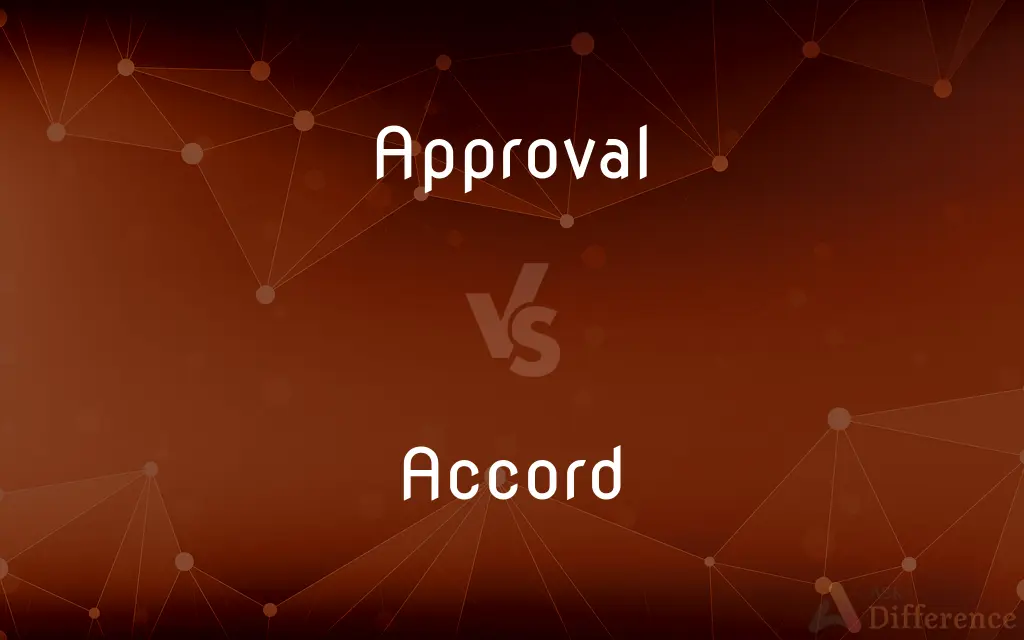Approval vs. Accord — What's the Difference?
By Fiza Rafique & Urooj Arif — Updated on March 15, 2024
Approval refers to formal consent or agreement, typically given after evaluation, while accord is a harmonious agreement or treaty between two parties without the necessity of one approving the other.

Difference Between Approval and Accord
Table of Contents
ADVERTISEMENT
Key Differences
Approval is a formal acknowledgment or consent given by a person or group, often after a review or assessment process. On the other hand, accord refers to an agreement or consensus reached between two or more parties, characterized by mutual understanding and harmony. Unlike approval, which is unidirectional, accord implies a more egalitarian relationship where parties come to a mutual agreement or treaty, often through negotiation or discussion.
While approval is often required in contexts where policies, regulations, or standards must be met before proceeding with an action or decision, accord is sought in situations requiring cooperation and mutual agreement, such as diplomatic negotiations or agreements between organizations. Approval is about meeting set criteria or gaining permission, whereas accord focuses on reaching a common ground or agreement.
In the process of obtaining approval, there's typically a clear process or criteria to be followed, and it is often documented and formalized. The entity seeking approval must submit to the judgment or evaluation of the approving authority. In contrast, reaching an accord involves negotiation and compromise, with both parties actively participating and contributing to the outcome. The resulting agreement reflects a shared decision rather than a decision imposed by one party onto another.
The terms can also differ in their application and context. Approval is commonly used in administrative, legal, and organizational contexts, indicating a permission or sanction given by an authority. Accord, however, is often used in international relations, business agreements, and personal relationships, highlighting the importance of mutual consent and agreement without the necessity of hierarchical approval.
Despite these differences, both approval and accord play significant roles in various aspects of society, governance, and personal interactions. They facilitate coordination and cooperation, whether through formal authorization or harmonious agreement, ensuring that actions, policies, and relationships are established and maintained with consent and mutual understanding.
ADVERTISEMENT
Comparison Chart
Definition
Formal consent or agreement given by an authority.
Harmonious agreement or treaty between parties.
Nature
Hierarchical and evaluative.
Egalitarian and cooperative.
Requirement
Evaluation or assessment by an authority.
Mutual understanding and agreement.
Process
Formalized process with clear criteria.
Negotiation and compromise without fixed criteria.
Context
Often used in administrative, legal, and organizational settings.
Common in international relations, business agreements, and personal relationships.
Outcome
Permission or sanction to proceed.
Mutual agreement or treaty.
Directionality
Unidirectional (from authority to recipient).
Bidirectional (mutual agreement).
Example
A government body gives approval for a new drug.
Two countries sign an accord to promote trade.
Compare with Definitions
Approval
Formal consent given by an authority.
The committee's approval was required to start the research.
Accord
A mutual agreement or treaty.
The peace accord ended years of conflict.
Approval
Necessary for proceeding with actions.
The city council's approval is crucial for the construction of the new park.
Accord
Used in various contexts for cooperation.
The cultural exchange accord promoted mutual respect and understanding.
Approval
Often documented and formalized.
The project received official approval on March 1st.
Accord
Reflects mutual understanding.
An accord was reached on environmental protection measures.
Approval
Implies meeting specific criteria.
Approval for the loan depends on your credit score.
Accord
Reached through negotiation and compromise.
The business accord was signed after months of discussions.
Approval
Hierarchical, involving assessment.
The manager's approval is necessary for vacation requests.
Accord
Egalitarian, without hierarchy.
The accord between the two departments facilitated smoother operations.
Approval
The act or an instance of approving.
Accord
To give or grant, especially as being due or appropriate
Accorded the president the proper deference.
Approval
An official approbation; a sanction.
Accord
(Archaic) To cause to conform or agree; bring into harmony.
Approval
Favorable regard; commendation.
Accord
To be in agreement, unity, or harmony.
Approval
An expression granting permission; an indication of agreement with a proposal; an acknowledgement that a person, thing, or event meets requirements.
I need to get an approval on this purchase order.
Accord
Agreement; harmony
Act in accord with university policies.
Approval
An expression of favorable acceptance and encouragement; a compliment that also condones.
Words of approval never seem to come from him.
Accord
A settlement or compromise between conflicting parties
The strikers and the owners reached an accord.
Approval
Something mailed by a seller to a collector to match their stated interests; the collector can approve of or return the item.
Accord
Spontaneous or voluntary desire to take a certain action
The children returned on their own accord. He confessed of his own accord.
Approval
Approbation; sanction.
A censor . . . without whose approval n capital sentences are to be executed.
Accord
Agreement or concurrence of opinion, will, or action.
Approval
The formal act of giving approval;
He gave the project his blessing
His decision merited the approval of any sensible person
Accord
A harmony in sound, pitch and tone; concord.
Approval
A feeling of liking something or someone good;
Although she fussed at them, she secretly viewed all her children with approval
Accord
Agreement or harmony of things in general.
The accord of light and shade in painting
Approval
Acceptance as satisfactory;
He bought it on approval
Accord
A distinctive mixture of fragrances or the odor thereof.
Approval
A message expressing a favorable opinion;
Words of approval seldom passed his lips
Accord
(legal) An agreement between parties in controversy, by which satisfaction for an injury is stipulated, and which, when executed, prevents a lawsuit.
Accord
(international law) An international agreement.
The Geneva Accord of 1954 ended the French-Indochinese War.
Accord
(obsolete) Assent
Accord
Voluntary or spontaneous impulse to act.
Nobody told me to do it. I did it of my own accord.
Accord
(transitive) To make to agree or correspond; to suit one thing to another; to adjust.
Accord
(transitive) To bring (people) to an agreement; to reconcile, settle, adjust or harmonize.
Accord
(intransitive) To agree or correspond; to be in harmony; to be concordant.
Accord
(intransitive) To agree in pitch and tone.
Accord
To grant as suitable or proper; to concede or award.
Accord
To give consent.
Accord
To arrive at an agreement.
Accord
Agreement or concurrence of opinion, will, or action; harmony of mind; consent; assent.
A mediator of an accord and peace between them.
These all continued with one accord in prayer.
Accord
Harmony of sounds; agreement in pitch and tone; concord; as, the accord of tones.
Those sweet accords are even the angels' lays.
Accord
Agreement, harmony, or just correspondence of things; as, the accord of light and shade in painting.
Accord
Voluntary or spontaneous motion or impulse to act; - preceded by own; as, of one's own accord.
That which groweth of its own accord of thy harvest thou shalt not reap.
Of his own accord he went unto you.
Accord
An agreement between parties in controversy, by which satisfaction for an injury is stipulated, and which, when executed, bars a suit.
They rushed with one accord into the theater.
Accord
To make to agree or correspond; to suit one thing to another; to adjust; - followed by to.
Her hands accorded the lute's music to the voice.
Accord
To bring to an agreement, as persons; to reconcile; to settle, adjust, harmonize, or compose, as things; as, to accord suits or controversies.
When they were accorded from the fray.
All which particulars, being confessedly knotty and difficult can never be accorded but by a competent stock of critical learning.
Accord
To grant as suitable or proper; to concede; to award; as, to accord to one due praise.
Accord
To agree; to correspond; to be in harmony; - followed by with, formerly also by to; as, his disposition accords with his looks.
My heart accordeth with my tongue.
Thy actions to thy words accord.
Accord
To agree in pitch and tone.
Accord
Harmony of people's opinions or actions or characters;
The two parties were in agreement
Accord
Concurrence of opinion;
We are in accord with your proposal
Accord
A written agreement between two states or sovereigns
Accord
Sympathetic compatibility
Accord
Go together;
The colors don't harmonize
Their ideas concorded
Accord
Allow to have;
Grant a privilege
Common Curiosities
How is accord different from approval?
Accord is a mutual agreement or consensus reached between parties, emphasizing harmony and cooperation without the hierarchical aspect of approval.
In what contexts might one seek approval?
Approval is often sought in organizational, legal, or administrative contexts where permission from a higher authority is required.
Where is accord commonly used?
Accord is commonly used in international relations, business agreements, and personal relationships, focusing on mutual agreement and understanding.
What is approval?
Approval is formal consent or endorsement given by an authority, often after evaluating adherence to certain criteria or standards.
Can approval and accord coexist in a single process?
Yes, in some cases, both approval and accord may be involved in a process, such as a project that requires approval from authorities and accord among different stakeholders.
Is approval always formalized?
Typically, yes. Approval processes are usually formalized through documentation and adherence to established criteria.
What are the key elements in reaching an accord?
Key elements include negotiation, compromise, and the mutual willingness of parties to reach an agreement.
Can accord be reached without approval?
In some contexts, yes. Accord can be based solely on mutual agreement without needing formal approval from an external authority.
Why is accord important in international relations?
Accord is crucial for maintaining peace, facilitating trade, and promoting cooperation between countries through mutual agreements.
Can a lack of approval hinder progress?
Yes, without the necessary approval, projects or actions may be delayed or halted, especially in contexts where formal consent is required.
How does the directionality of approval and accord differ?
Approval is unidirectional, flowing from an authority to a recipient, while accord is bidirectional, involving mutual agreement.
How does accord contribute to cooperation between parties?
Accord fosters cooperation by ensuring that all parties are in agreement and committed to the terms of the agreement, enhancing collaborative efforts.
What is the significance of approval in organizational settings?
Approval signifies that a decision or action meets the established policies or standards of the organization, allowing it to proceed.
What happens if approval is revoked after it has been given?
Revocation of approval can halt ongoing projects or actions, requiring a reassessment or modification to meet the approval criteria again.
What role does negotiation play in reaching an accord?
Negotiation is a fundamental process in reaching an accord, as it involves discussion and compromise to arrive at a mutually acceptable agreement.
Share Your Discovery

Previous Comparison
Diazepam vs. Tramadol
Next Comparison
Acceptance vs. AcceptingAuthor Spotlight
Written by
Fiza RafiqueFiza Rafique is a skilled content writer at AskDifference.com, where she meticulously refines and enhances written pieces. Drawing from her vast editorial expertise, Fiza ensures clarity, accuracy, and precision in every article. Passionate about language, she continually seeks to elevate the quality of content for readers worldwide.
Co-written by
Urooj ArifUrooj is a skilled content writer at Ask Difference, known for her exceptional ability to simplify complex topics into engaging and informative content. With a passion for research and a flair for clear, concise writing, she consistently delivers articles that resonate with our diverse audience.














































